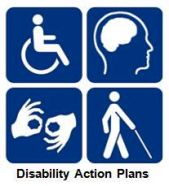Disability Action Plans

Designated public authorities are subject to two interrelated duties under Sections 49A and 49B of the Disability Discrimination Act 1995.
Section 49A places a duty on designated public authorities to have due regard to the need to:
- promote positive attitudes towards disabled persons, and
- encourage participation by disabled persons in public life
The aim of the duty is to oblige public authorities to give appropriate consideration to how they can best promote positive attitudes towards disabled persons and encourage participation by disabled persons in public life.
Section 49B places a duty on each designated public authority to prepare a plan outlining how it proposes to fulfil the Section 49A duty. A plan is a description of procedural and practical arrangements that each public authority has committed itself to. These plans are commonly called Disability Action Plans (DAPs).
In developing Disability Action Plans, public authorities should focus on; developing a range of action measures designed to encourage cultural change in how disabled people are perceived by wider society and, increase representation of disabled people in public life. This aim is for disabled people to play a significantly greater role in the social, economic and political life of Northern Ireland.
Disability Action Plans should:
- Prioritise the action measures likely to have the greatest impact in respect of the duties. Prioritisation should be informed by consultation with disabled people
- Encourage feedback from disabled people and their representative groups on how authorities can encourage greater participation by disabled people in public life and act on this feedback
- Be written in plain English and available on request in alternative formats
- Include references, as appropriate, to working with other public authorities where this will result in the more effective implementation of the duties.
The action measures may therefore include:
- Removing barriers to disabled people’s participation and persuading others to encourage such participation
- Positive action measures to facilitate appointments of disabled people to public life positions, remunerated or otherwise
- Measures relating to the DDA protections e.g. employment, positive action, monitoring and, measures which are already included in the public authority’s equality scheme or linked action plan. The focus of the action measures should however be on the two disability duties
- Addressing negative stereotypes of disabled people and promoting positive role models in public literature in respect of disabled employees, service providers and disabled people in public life positions.
What arrangements must be outlined in plans?
Disability Action Plans must outline the arrangements relating to the broad activities that commonly feature in equality schemes; namely:
(a) Staff training and awareness-raising
(b) Monitoring
(c) Consultation
(d) Review of information and consideration of positive action
(e) Timeframe for measures outlined in the plan / duration of the plan
(f) A Disability Action Plan must specify details of how the plan will be published - There is a similar obligation in relation to Section 75 Equality Schemes and common publication arrangement may be adopted for both.
Disability Action Plans should provide a;
(g) Description of the positive action that is proposed or currently being taken
Reviewing and reporting progress
Each public authority has discretion in how it satisfies these obligations and may adopt arrangements that are effective in terms of their own specific circumstances, functions and resources. There will be a legitimate expectation, and indeed a public law obligation, that the public authority will follow its stated arrangements as set out in its Disability Action Plan.
Collating and producing an annual evaluation of progress will assist public authorities in benchmarking current practices against future actions and allow public authorities to record their success in implementing the duties
Legislative background to the Duties
The Disability Discrimination Act (DDA) came into effect in 1995 and protected disabled people in the areas of, employment, access to goods, facilities and services and buying or renting land or property.
It was later followed by the Disability Discrimination (Northern Ireland) Order (DDO) 2006, strengthening both, the definition of disability and protection afforded to those disabled people with mental health disabilities.
On 1 January 2007, the DDO also added the Sections 49A and 49B duties to the DDA. These placed new duties on public authorities to have due regard to the need to:
-
Promote positive attitudes towards disabled people; and to
-
Encourage participation by disabled people in public life.
Sections 49A and 49B of the DDO are only one part of a broader body of disability equality duties operating in Northern Ireland.
In developing Disability Action Plans, public authorities should focus on; developing a range of action measures designed to encourage cultural change in how disabled people are perceived by wider society and, increase representation of disabled people in public life. This aim is for disabled people to play a significantly greater role in the social, economic and political life of Northern Ireland.
Further information:
This guidance should be read in conjunction with the following publications which provide an overview of the due regard duty: